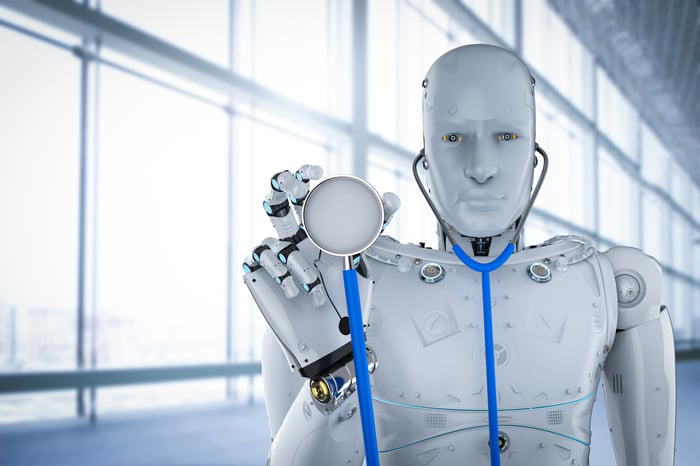The healthcare industry is constantly evolving. And as technology and medicine become closer allies, one area underneath the broader healthcare umbrella is experiencing widespread change.
Nursing has faced numerous challenges in recent years, but some believe that artificial intelligence (AI) could save the day. Here’s how Nvidia (NASDAQ: NVDA) is getting involved with healthcare, and how the company plans to disrupt the nursing workforce.
Nursing shortages are a real problem
One of the biggest challenges facing hospitals right now is nurse shortages. According to a survey conducted by management consulting firm McKinsey, nearly one-third of nurses may leave their job within the next year.
The reason? Money. Per McKinsey’s report, nurses cited “inadequate compensation” as the top reason for considering leaving their job in patient care.
According to the Bureau of Labor Statistics, median pay for nurses is about $39 per hour, or $81,000 per year. Considering median household income is about $75,000, nursing might appear more appealing compared to other careers.
But nurses typically take on longer shifts compared to traditional office work, and are actively vulnerable to higher-risk environments given the exposure to sick patients.
Artificial intelligence (AI) could come to the rescue
Nvidia has been the poster child of the AI revolution. The company is best known for its high-performance graphics processing units (GPUs) and data center services. However, Nvidia is also making inroads in software and is quietly building an end-to-end AI solution.
And Nvidia is looking to apply AI to healthcare. The company recently revealed that it is working with a start-up called Hippocratic AI, which is developing virtual agents that are capable of understanding and processing basic tasks related to patient care.
For example, the company’s generative AI can help with appointment scheduling as well as follow-up activity after a patient is discharged. To help build its health-focused large language model (LLM), Hippocratic AI is leveraging Nvidia’s Avatar Cloud and NIM microservices technology.
Remember to think long term
Munjal Shah, co-founder and CEO of Hippocratic AI, stated that the end goal of these AI healthcare agents is to “help mitigate widespread staffing shortages and increase access to high-quality care.”
This is a noble mission, but one that should be understood on a deeper level. Patient care is extremely complex. This is why practicing medicine requires several years of education, and why there are so many different types of doctors and specialists.
To think that chatbots will replace human-provided care is almost otherworldly. And yet, here it is — sort of. In the grand scheme of things, Hippocratic AI’s agents are performing fairly basic functions. Time will tell if the technology becomes sophisticated enough to provide commensurate (or superior) value to real-life nurses and doctors.
I think AI has a multitude of applications in the healthcare arena, but I would not bet on robots replacing doctors. Instead, I think a more reasonable area where AI can disrupt medicine is in clinical trials.
For example, Novo Nordisk, which is the pharmaceutical machine behind Ozempic, Rybelsus, and Wegovy, is currently funding an Nvidia-powered supercomputer that it hopes will help in drug development.
Bringing accelerated computing capabilities to the clinical trial process can theoretically assist researchers process data more efficiently. Subsequently, pharmaceutical businesses could uncover meaningful insights including expanded indications for their medicines.
The bigger theme here is that artificial intelligence is being introduced into many facets of healthcare. My personal outlook is that AI will become an integral pillar augmenting research and development. While more personal use cases surrounding patient care could be on the horizon, I see these as lofty ambitions.
In either case, Nvidia is involved in one way or another. I think now is a great time to consider scooping up shares as the company aggressively pursues markets outside of its core chip business.
*Original Story From https://www.msn.com/en-us/health/other/nvidia-is-bringing-artificial-intelligence-ai-to-the-healthcare-space-here-s-how/ar-BB1l070F
